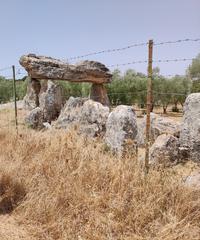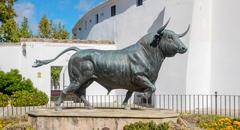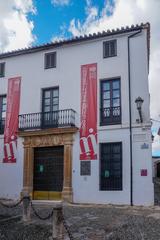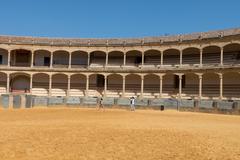Mirador de Ronda: Comprehensive Visiting Hours, Tickets, and Travel Guide
Date: 14/06/2025
Introduction
Perched atop Ronda’s dramatic El Tajo Gorge, the Mirador de Ronda is a must-see for any traveler seeking the perfect blend of Andalusian history, breathtaking panoramas, and vibrant cultural atmosphere. This guide provides all the essential details—visiting hours, tickets, accessibility, nearby attractions, and practical tips—to maximize your experience at one of Spain’s most iconic viewpoints. Whether you are a history enthusiast, nature lover, or casual explorer, Mirador de Ronda offers an unforgettable perspective on Ronda’s layered past and scenic beauty (Nothing Familiar; Isolated Traveller; Spain.info).
Historical and Cultural Background
Ronda’s Origins and the Emergence of Miradores
Ronda is one of Spain’s oldest towns, founded by the Celts in the 6th century BCE as Arunda. Over time, it was shaped by Romans (who called it Acinipo), Visigoths, and a significant Islamic Moorish era that saw the construction of fortifications, bridges, and water mines. Following its Christian reconquest in 1485, Ronda’s architecture evolved with Gothic, Renaissance, and Baroque influences (Isolated Traveller; Spain.info).
The city’s dramatic setting—divided by a deep gorge—naturally gave rise to miradores, or scenic viewpoints, which served both defensive and aesthetic purposes. Over the centuries, these spots became integral to Ronda’s identity and allure, drawing artists, writers, and travelers inspired by the town’s romantic vistas (Nomads Travel Guide).
Artistic and Literary Significance
Ronda’s landscapes, as seen from its miradores, have inspired figures like Rainer Maria Rilke and Ernest Hemingway, who immortalized the city in his writings. The tradition of “Viajeros Románticos” (Romantic Travelers) in the 19th century helped cement Ronda’s reputation as a cultural destination (Holly Hits the Road). The Mirador de Ronda, with its sweeping views and evocative setting, is central to this artistic heritage.
Mirador de Ronda: Location, Architecture, and Visitor Information
Location and Architectural Features
The Mirador de Ronda sits adjacent to the Alameda del Tajo park, just steps from the Plaza de Toros bullring and a short walk from the iconic Puente Nuevo bridge. The viewpoint projects over the cliff edge, offering unobstructed views of the El Tajo Gorge, the surrounding Serranía de Ronda mountains, and Ronda’s unique urban layout (Nomads Travel Guide; Nothing Familiar). The 19th-century promenade features ornamental railings, mature trees, and benches, making it ideal for both leisurely strolls and contemplative moments.
Accessibility and Facilities
The mirador and park are generally wheelchair accessible, featuring paved paths and ramps. Public restrooms are available nearby in the park, and plenty of cafés and restaurants can be found within a short walk (Nomads Travel Guide). Families with children will find open spaces for play, but supervision is advised near the railings due to the sheer drop-offs.
Visiting Hours and Tickets
- Hours: Open 24 hours a day, year-round. While you can visit any time, daylight hours are recommended for safety and optimal views.
- Admission: Free—no tickets required to access the viewpoint (Tricks and Trips).
- Nearby Attractions: Some nearby sites, like the Plaza de Toros and Puente Nuevo museum, have their own opening hours and entry fees (Wanderlust Chloe).
Best Times to Visit
- Spring (April–June) & Autumn (September–November): Mild temperatures, lush scenery, and fewer crowds (Ronda Today).
- Summer: Can be very hot and crowded, especially midday. Arrive early or late for a more comfortable visit (The Viva La Vita).
- Winter: Fewer tourists and crisp weather, though some attractions may have reduced hours.
For photography, the golden hours—shortly after sunrise and before sunset—provide the best light and fewer people (Spain Guides).
What to Expect at the Mirador
Panoramic Views
Standing at the Mirador de Ronda, you’ll enjoy sweeping vistas of the El Tajo Gorge, the whitewashed old town, the Puente Nuevo bridge, and the rolling countryside beyond (Living Nomads). On clear days, the Sierra de las Nieves peaks are visible in the distance. Benches and shaded areas make this a peaceful spot to relax and take in the scenery.
Activities and Experiences
- Leisurely Walks: The Alameda del Tajo park is ideal for strolling, with flowerbeds, shaded avenues, and occasional live music (exploredbymarta.com).
- Sunset Viewing: The viewpoint is especially popular at sunset, when the cliffs and rooftops glow in the evening light (global-traveltips.blogspot.com).
- Birdwatching: The cliffs are home to swifts, kestrels, and sometimes griffon vultures (andalucialovers.com).
- Picnicking: Enjoy snacks from local bakeries on benches overlooking the gorge.
Safety and Comfort
The mirador is protected by sturdy railings. However, as the area can be crowded and the stone pavement slippery when wet, comfortable shoes and attention to your belongings are recommended. Sun protection is important in summer, and layers are advisable in winter.
Nearby Attractions
- Puente Nuevo: Ronda’s iconic 18th-century bridge, with spectacular views and a small museum (Wanderlust Chloe).
- Plaza de Toros: One of Spain’s oldest bullrings, offering guided tours (Explorial).
- Old Town (La Ciudad): Explore Moorish architecture and winding streets (Spain Guides).
- Casa del Rey Moro: 18th-century mansion with a Moorish water mine (Spain Guides).
- Wine Tasting: Sample local wines at nearby bodegas (Wanderlust Chloe).
Practical Travel Tips
- Arrive early or stay late for the best light and fewer crowds.
- Consider an overnight stay to experience Ronda after day-trippers leave (The Viva La Vita).
- Parking: Available but limited; public transport or walking is recommended in peak season (Ronda Today).
- Accessibility: The mirador is mostly accessible, though some old town streets are cobbled or steep.
- Drones: Generally prohibited for safety and privacy.
Seasonal Events and Local Culture
Ronda hosts vibrant festivals throughout the year, such as the Feria de Pedro Romero in September, which celebrates local traditions and features parades, music, and traditional dress (Spain Guides). Street musicians often play near the mirador, adding to the lively atmosphere (Nomads Travel Guide).
Sustainability and Responsible Tourism
Ronda prioritizes the preservation of its natural and cultural heritage. Visitors are encouraged to stay on marked paths, dispose of litter responsibly, and support local businesses (Ronda Today). Guided tours and audio guides are available for a deeper understanding of the city’s history.
Frequently Asked Questions (FAQ)
Q: Is there an entrance fee for Mirador de Ronda?
A: No, it is a free public viewpoint with open access 24/7.
Q: What are the best hours to visit?
A: Daylight hours, especially sunrise and sunset, are ideal for views and photography.
Q: Is the viewpoint wheelchair accessible?
A: Yes, the main promenade and viewpoint are accessible, though some adjacent streets are cobbled.
Q: Are guided tours available?
A: Yes, many local operators include the mirador in their walking tours.
Q: Are drones allowed?
A: No, drones are generally prohibited due to safety and privacy concerns.
Visuals and Media Recommendations
Include high-quality images of the Mirador de Ronda at sunrise and sunset with descriptive alt text such as “Mirador de Ronda panoramic view at sunset.” A map marking the mirador and nearby attractions enhances planning.
Summary and Final Tips
The Mirador de Ronda is more than a stunning overlook—it is a living symbol of Ronda’s dramatic history, artistry, and natural grandeur. With free, year-round access, it’s an inviting destination for all visitors. For the richest experience, time your visit for early morning or late afternoon, consider guided tours for cultural context, and explore nearby attractions for a full appreciation of Ronda’s charm.
To enhance your journey, use resources like the Audiala app for audio tours and insider tips, and follow related social media channels for travel inspiration (Ronda Today; Spain Guides).
Embark on your visit to the Mirador de Ronda and discover why it continues to captivate visitors from around the world.
Sources and Further Reading
- Ronda Spain - A City in the Sky, 2023, Nothing Familiar
- 20 Interesting Ronda Facts, 2023, Isolated Traveller
- Ronda Bridge, Viewpoints and Other Incredible City Panoramas, 2023, Conversant Traveller
- Ronda, Destination Guide, 2023, Spain.info
- Mirador del Puente de Ronda, 2023, Nomads Travel Guide
- Mirador de Aldehuela Ronda, 2023, Tricks and Trips
- A Ronda Spain Day Trip: Architectural Wonders and Spanish Charm, 2023, Holly Hits the Road
- Ronda Attractions: Top 10 Things to Do, 2023, HideetSeek
- 20 Essential Questions to Ask Before Visiting Ronda, 2023, Ronda Today
- Things to Do in Ronda Spain, 2023, Wanderlust Chloe
- Ultimate Bucket List Things to Do in Ronda, Spain, 2025, Explored By Marta
- Holiday Tips for Ronda Spain, 2025, Global Travel Tips Blog
- Best Things to Do Ronda Attractions, 2023, Andalucia Lovers
- Things to Do in Ronda, 2023, Voyage Tips
- Ronda Spain Exploring Its Historic Treasures and Breathtaking Views, 2023, Spanish Plains
- Ronda’s 5 Hidden Gems Beyond the Tourist Trail, 2023, Explorial
- Top Destinations Ronda, 2023, Spain Guides
- Tips for Visiting Ronda Spain, 2023, The Viva La Vita



